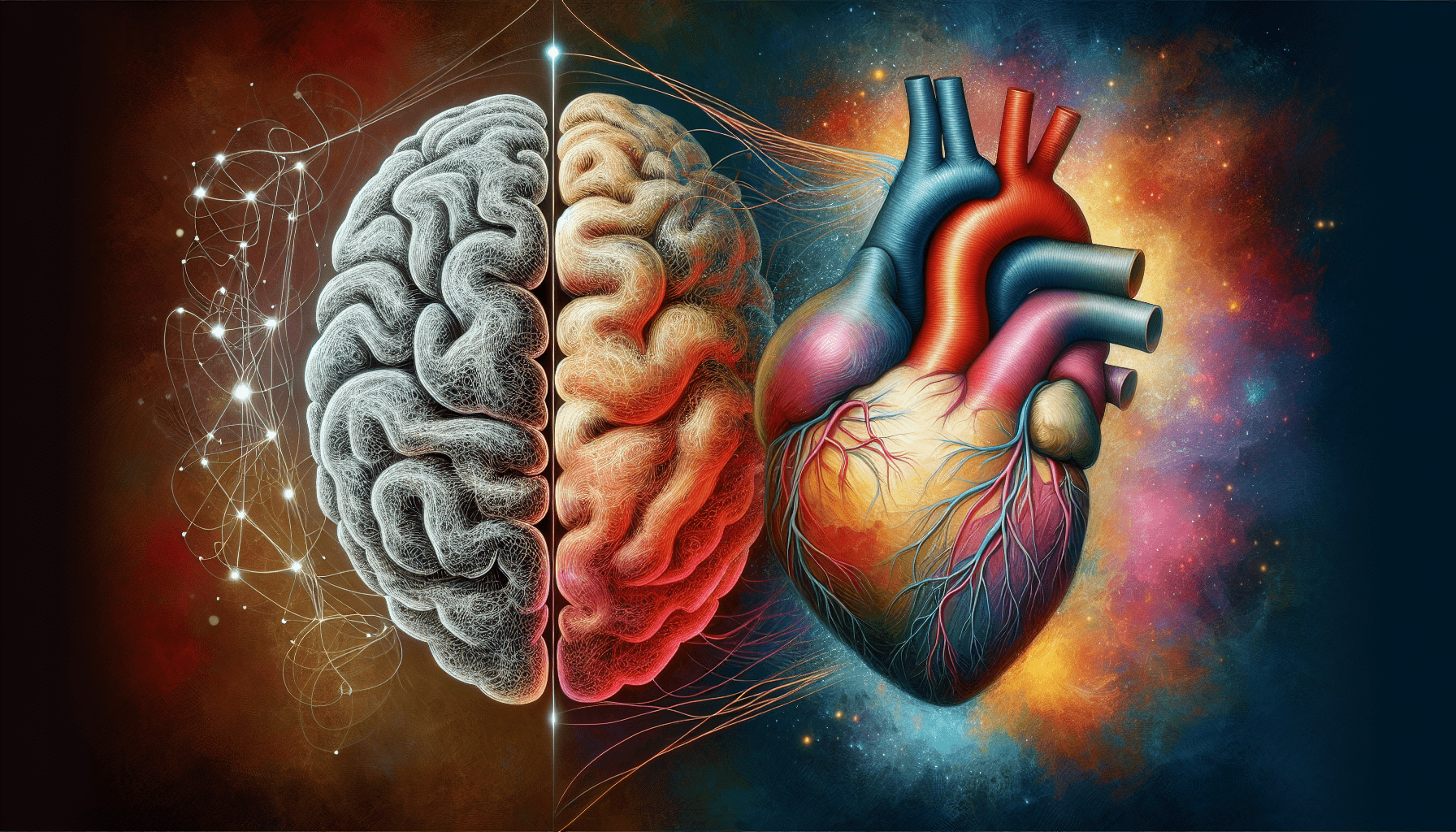Have you ever wondered about the connection between cognitive decline and cardiovascular disease? Well, in this article, we are going to explore the link between these two health concerns. Cognitive decline, such as memory loss and impaired thinking, is believed to be associated with an increased risk of cardiovascular disease. We will delve into the research findings that shed light on this phenomenon and discuss the potential mechanisms behind it. So, let's take a closer look at this fascinating topic and see how it may impact our overall well-being.
Understanding Cognitive Decline
Definition and understanding of cognitive decline
Cognitive decline refers to the gradual deterioration of cognitive function, which includes the ability to think, reason, remember, and make decisions. It is a natural part of the aging process, but in some cases, it can occur at a faster rate, leading to cognitive impairment or even dementia. Cognitive decline can have a significant impact on daily life, affecting work, relationships, and overall quality of life.
Different stages of cognitive decline
Cognitive decline can be categorized into different stages, ranging from mild cognitive impairment (MCI) to severe dementia. MCI is characterized by noticeable cognitive changes that do not interfere significantly with daily activities. It is often considered a precursor to dementia, although not everyone with MCI will develop dementia. Dementia, on the other hand, represents a more severe form of cognitive decline, where individuals have significant memory loss, impaired thinking abilities, and difficulty with daily tasks.
Symptoms of cognitive decline
The symptoms of cognitive decline can vary depending on the stage and underlying cause. In the early stages, individuals may experience mild forgetfulness, difficulty finding words, trouble concentrating, and challenges with multitasking. As the decline progresses, memory loss becomes more pronounced, and individuals may struggle with organizing thoughts, solving problems, and performing familiar tasks. In severe cases, cognitive decline can lead to disorientation, personality changes, and an inability to recognize loved ones.
Understanding Cardiovascular Disease
Definition and understanding of cardiovascular disease
Cardiovascular disease refers to a class of diseases that involve the heart and blood vessels. It encompasses a wide range of conditions, including coronary artery disease, heart failure, stroke, and peripheral artery disease. Cardiovascular disease is a leading cause of morbidity and mortality worldwide, and it can have a significant impact on an individual's overall health and well-being.
Different types of cardiovascular disease
There are several types of cardiovascular disease, each affecting different parts of the cardiovascular system. Coronary artery disease occurs when the blood vessels that supply the heart with oxygen become narrowed or blocked, leading to chest pain (angina) or a heart attack. Heart failure happens when the heart is unable to pump blood effectively, leading to fatigue, shortness of breath, and fluid retention. Stroke occurs when the blood supply to the brain is interrupted, resulting in the loss of brain function. Peripheral artery disease occurs when there is a buildup of plaque in the arteries, leading to reduced blood flow to the limbs.
Risk factors and symptoms associated with cardiovascular disease
Various risk factors can contribute to the development of cardiovascular disease. These include high blood pressure, high cholesterol levels, smoking, obesity, diabetes, family history of heart disease, sedentary lifestyle, and unhealthy diet. Symptoms of cardiovascular disease can vary depending on the specific condition but may involve chest pain or discomfort, shortness of breath, fatigue, dizziness, irregular heartbeats, and swelling in the legs or ankles.

Cognition and Heart Health
The relationship between heart health and brain function
Emerging evidence suggests that there is a close relationship between heart health and brain function. The brain requires a constant supply of oxygen and nutrients delivered through the bloodstream. The heart, as the main pumping organ, plays a crucial role in ensuring adequate blood flow to the brain. Any disruption in this blood flow, such as a blockage or reduced circulation due to cardiovascular disease, can have detrimental effects on brain function.
How cardiovascular health can impact cognitive abilities
Research has shown that poor cardiovascular health, including conditions like high blood pressure, atherosclerosis, and heart disease, can increase the risk of cognitive decline and dementia. The mechanisms behind this relationship are complex and multifactorial. Reduced blood flow to the brain can result in hypoxia (oxygen deprivation), which can damage brain cells and impair cognitive function. Additionally, cardiovascular disease can lead to strokes or mini-strokes, which can cause further brain damage and contribute to cognitive decline.
Studies Showing Links Between Cognitive Decline and Cardiovascular Disease
Overview of major studies on the topic
Numerous studies have investigated the association between cognitive decline and cardiovascular disease. One notable study is the Framingham Heart Study, which followed participants over several decades and found that individuals with high blood pressure and other cardiovascular risk factors had a higher likelihood of developing dementia. The REGARDS study, a large-scale population-based study, also demonstrated a clear link between cardiovascular disease and cognitive decline.
Key findings from these studies
These studies and others consistently show that there is a strong association between cardiovascular disease and cognitive decline. The risk of developing cognitive impairment or dementia is significantly higher in individuals with cardiovascular risk factors, such as high blood pressure, diabetes, and obesity. Moreover, the presence of cardiovascular disease, such as coronary artery disease or heart failure, further increases the risk. These findings highlight the importance of maintaining heart health to preserve cognitive function.

Mechanisms Behind The Link
Understanding blood flow to the brain
Blood flow to the brain is essential for the delivery of nutrients and oxygen that support optimal brain function. The arteries that supply the brain can become narrowed or blocked due to atherosclerosis, a condition characterized by the buildup of plaque within the artery walls. This restricts the blood flow to the brain, leading to hypoperfusion or reduced perfusion, which can contribute to cognitive decline.
Brain damage caused by strokes and cardiovascular events
Cardiovascular events, such as strokes, can have severe consequences on brain function. When blood flow to a specific part of the brain is interrupted, brain cells in that region may die, resulting in the loss of cognitive abilities controlled by that area. Strokes can also cause small, silent brain lesions that accumulate over time and contribute to cognitive decline.
The role of high blood pressure and cholesterol in cognitive decline
Hypertension (high blood pressure) and elevated cholesterol levels are common risk factors for both cardiovascular disease and cognitive decline. High blood pressure can damage blood vessels throughout the body, including those in the brain, impairing blood flow and potentially leading to cognitive impairment. Similarly, high cholesterol levels can contribute to atherosclerosis, increasing the risk of vascular-related cognitive decline.
Common Risk Factors
Age as a shared risk factor
Both cognitive decline and cardiovascular disease are more prevalent with advancing age. As individuals grow older, their risk of developing chronic conditions, such as high blood pressure, diabetes, and atherosclerosis, increases. Aging also contributes to natural changes in brain structure and function, making older individuals more susceptible to cognitive decline.
The role of lifestyle and dietary habits
Unhealthy lifestyle and dietary habits can significantly contribute to the development of both cognitive decline and cardiovascular disease. Sedentary lifestyle, poor diet characterized by high intake of processed foods, saturated fats, and refined sugars, smoking, excessive alcohol consumption, and lack of physical and mental stimulation can all increase the risk of these conditions. Adopting a healthy lifestyle, including regular exercise, a balanced diet, avoidance of smoking and excessive alcohol, and engaging in mentally stimulating activities, can help reduce the risk.
Genetic predispositions to both conditions
Some individuals may have a genetic predisposition to both cognitive decline and cardiovascular disease. Certain genes can influence the regulation of blood pressure, cholesterol metabolism, and overall cardiovascular health. Additionally, genetic factors can play a role in the development of neurodegenerative diseases, such as Alzheimer's disease, which is associated with cognitive decline. Understanding genetic risk factors can help identify individuals who may be at higher risk and may benefit from targeted interventions or screenings.
Prevention and Management Strategies
Importance of regular medical check-ups
Regular medical check-ups are crucial for both the prevention and management of cognitive decline and cardiovascular disease. These check-ups allow healthcare professionals to assess and monitor risk factors, such as blood pressure, cholesterol levels, and blood sugar. Early detection and intervention can help prevent or manage these conditions more effectively, potentially slowing down the progression of cognitive decline or reducing the risk of cardiovascular events.
The impact of a healthy lifestyle and balanced diet
Adopting a healthy lifestyle and maintaining a balanced diet are essential for overall health, including brain and heart health. Engaging in regular physical exercise can promote cardiovascular fitness and improve blood flow to the brain. A nutrient-rich diet, focusing on fruits, vegetables, whole grains, lean proteins, and healthy fats, can provide the necessary nutrients for optimal brain and cardiovascular function. Additionally, it is important to limit the intake of processed foods, saturated and trans fats, and sugary beverages, as they can contribute to inflammation and vascular damage.
Potential benefits of cognitive and physical exercises
Engaging in cognitive and physical exercises has shown promise in preserving cognitive function and improving cardiovascular health. Mental exercises, such as puzzles, reading, and learning new skills, can help stimulate the brain and maintain cognitive abilities. Regular physical exercise, including aerobic activities, strength training, and balance exercises, can promote cardiovascular fitness, improve blood flow, and enhance overall brain health. Combining cognitive and physical exercises may have synergistic effects and provide greater benefits in terms of preventing cognitive decline and reducing the risk of cardiovascular disease.
The Role of Medications
Common drugs prescribed for cardiovascular diseases
There are various medications available for the management of cardiovascular diseases. These can include antihypertensive medications to control high blood pressure, statins to lower cholesterol levels, antiplatelet drugs to prevent blood clot formation, and medications to improve heart function in heart failure patients. Each medication targets specific aspects of cardiovascular health and aims to reduce the risk of cardiovascular events.
How these drugs can affect cognitive function
While medications play a crucial role in managing cardiovascular diseases, some drugs may have potential side effects on cognitive function. For example, certain antihypertensive medications, particularly those that cross the blood-brain barrier, have been associated with cognitive impairment or changes in mood. However, it is important to note that the benefits of these medications in managing cardiovascular diseases generally outweigh the potential risks. Healthcare providers closely monitor patients on these medications and make adjustments if necessary.
Medications that can slow cognitive decline in patients with cardiovascular disease
Research is ongoing to identify medications that may potentially slow down cognitive decline in patients with cardiovascular disease. For example, some studies have suggested that drugs used to treat Alzheimer's disease, such as cholinesterase inhibitors or memantine, may have potential benefits in individuals with vascular-related cognitive decline. These medications work by improving neurotransmitter function and protecting brain cells from damage. However, further research is needed to establish their effectiveness in this specific context.

Implications for Healthcare Providers
Training and resources for doctors on the link between cognitive decline and cardiovascular disease
Given the strong association between cognitive decline and cardiovascular disease, it is crucial for healthcare providers to receive adequate training and resources to understand and address this link. Medical education programs should include information on the relationship between these conditions, common risk factors, screening and diagnostic tools, and appropriate management strategies. This knowledge will enable healthcare providers to better identify patients at risk, initiate timely interventions, and provide comprehensive care.
Importance of early detection and intervention
Early detection and intervention play a significant role in mitigating the impact of both cognitive decline and cardiovascular disease. Regular health screenings, such as blood pressure measurements, cholesterol checks, and cognitive assessments, can help identify individuals at risk or in the early stages of these conditions. Early intervention, through lifestyle modifications, medication management, and targeted therapies, can slow down the progression, improve outcomes, and enhance overall quality of life for affected individuals.
Suggestions for patient education and support
Patient education and support are vital components of managing cognitive decline and cardiovascular disease. Healthcare providers should provide comprehensive information on the link between these conditions, common risk factors, and preventive strategies. Patients and their families should be encouraged to adopt a healthy lifestyle, adhere to medication regimens, and engage in regular cognitive and physical exercises. Support groups, counseling services, and community resources should also be made available to individuals and their caregivers, providing a network of emotional and practical support.
The Future of Research
Potential areas for future research on the link between cognitive decline and cardiovascular disease
The understanding of the link between cognitive decline and cardiovascular disease continues to evolve, and there are several potential areas for future research. Further studies could investigate the specific mechanisms by which cardiovascular disease impacts cognitive function, exploring the role of inflammation, oxidative stress, and vascular dysfunction. Additionally, longitudinal studies are needed to evaluate the effectiveness of interventions, such as lifestyle modifications and medication management, in preventing or slowing down cognitive decline in individuals with cardiovascular disease.
Implications of this research for new treatment options and strategies
Advancements in research on the link between cognitive decline and cardiovascular disease may lead to the development of new treatment options and strategies. Targeted therapies that can improve blood flow to the brain, reduce inflammation, or target specific molecular pathways may become available. Additionally, personalized medicine approaches, considering an individual's genetic predisposition and unique cardiovascular profile, may enhance treatment outcomes and prevent cognitive decline.
The potential impact of this research on public health policies and guidelines
Research on the link between cognitive decline and cardiovascular disease has important implications for public health policies and guidelines. A better understanding of the relationship between these conditions may inform the development of strategies to promote heart-healthy lifestyles, encourage early detection and intervention, and allocate resources for research and education. Public health campaigns focused on raising awareness about the link between cognitive decline and cardiovascular health can empower individuals to take proactive steps towards preventing these conditions and maintaining optimal brain function.
In conclusion, understanding the link between cognitive decline and cardiovascular disease is crucial for healthcare providers, patients, and society as a whole. Recognizing the relationship between these two conditions can lead to improved preventive measures, early detection, and targeted interventions. By taking steps to maintain heart health, adopting a healthy lifestyle, and seeking appropriate medical care, individuals can reduce their risk of cognitive decline and maintain optimal cognitive abilities throughout their lives.


